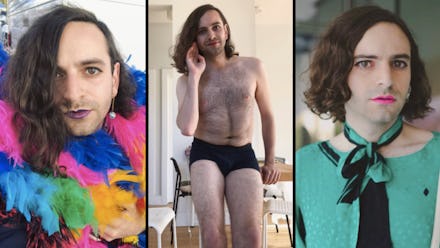After being body shamed on set, this genderqueer model decided to blame the industry, not their body

Transgender model/activist/writer Jacob Tobia's recent story of horrors induced on a photoshoot set after being told "we don't regularly have anything bigger than an 8 in our showroom" is sadly nothing new. (The U.S. average, it should be noted, is a 16.)
Models like Zuzanna Buchwald and Victoria's Secret Angel Erin Heatherton are just a few top models who have spoken out about the industry pressure to remain as petite as possible.
Tobia's experience on set does not divert from stories we've heard before — but their response, specifically their takeaway, is helping to shift the conversation from "what's wrong with me?" to "what's wrong with the person (or in this case brand) making me feel this way about my body?"
"When the fitting that I went to made me feel badly about my body, my first thought was 'I need to share this with people, to talk about why this is wrong,'" Tobia said in an interview. "And I didn't just want to talk about my body, I wanted people to see my body; to see how beautiful and sexy and cute it is. I wanted to take something that hurt me and, by the alchemy of social media, transform it into something that empowers all of us. Sometimes, a self-portrait in your underwear is the only thing that will do the trick."
"For a second, I started spiraling into a vortex of self-hatred and shame about my body," they wrote. "I almost started to feel ugly."
That's when Tobia stopped themselves, took a minute, a few deep breaths; it was through this that clarity came through. "There is nothing wrong with my body," Tobia said. "I have a great body. I have a gorgeous body. But my body is also one that the fashion industry refuses to recognize as worthy of consideration or beautification. Because I am feminine and large, because I am feminine and have big feet, the fashion industry dismisses me out of the gate."
Then Tobia dropped the real knowledge: "If I can't find a dress at your showroom, it's not because there's something wrong with my body, it's because there's something wrong wth your brand, with your brand values as beautiful."
It's an issue that extends far beyond the world of modeling. In fact, a 2016 study published in the psychology journal Child Development found that kids body shame their peers as early as first grade. While there are some that manage to find ways to enact "sweet revenge" or, like Khloe Kardashian, say hateful words directed at their body ultimately made them stronger, for most people who endure the cruelty of overt body shaming — or event an unwarranted comment on their appearance — the effects can be painful and long-lasting.
For Tobia, it's a subject they're trying to be more forthright about. "Over the past few months, I've been reconceptualizing my Instagram and my social media presence less as a tool for self promotion and more as a public journal of everything I'm going through trying to make it in the entertainment industry," they explained.
Tobia continued:
For years, I bottled up all of the negativity I encountered while living a visible life. I hid the fact that red carpets make me feel terrible, the fact that the fashion industry refuses to value my body so long as I have body hair, the fact that I've crash dieted on numerous occasions to fit into dresses that never really fit me in the first place, the fact that I have trouble getting a date because I am a visible trans person who doesn't pass in the binary. I stuffed all of that up and put on my game face, hoping that those feelings would just go away if I pretended hard enough. But as I've started moving up in the industry, things have just gotten more complicated, my need to process my feelings more intense.
With a recent bill in France banning "excessively thin" models, various lingerie campaigns featuring an inclusive roster of nontraditional models and ever-shifting body ideals perpetuated through pop culture (like Kendrick Lamar shouting out women with stretch marks on a recent track). Progress may be slow, but it is building.
Still, other issues remain: "Folks in the fashion world like having me around and revere my styling and aesthetic, but don't want to put me on their runways," Tobia said. "I guess people think of me less like Karlie Kloss and more like Patricia Field. I'm hoping that changes as the world learns to better value the natural beauty of transfeminine and gender-nonconforming people."
They ended with a message for the industry about supporting non-binary visibility: "We shouldn't be treated just as accessories to the fashion world. Genderfluid people should be treated as what we are: Some of the most influential and visionary voices in the industry today."